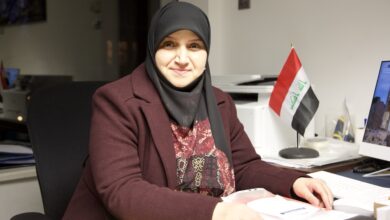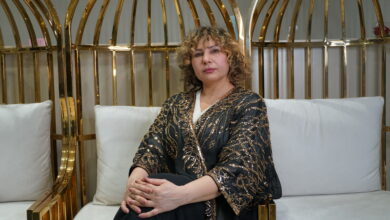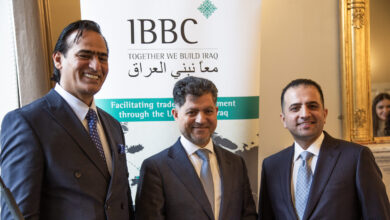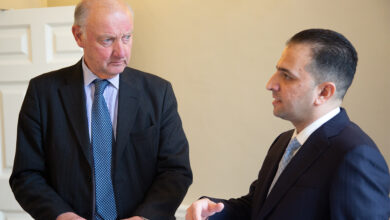Madam President,
Distinguished members of the Security Council,
Thank you very much.
With UNAMI’s next mandate renewal around the corner, I would like to take the opportunity to reflect, just a bit, and more importantly: to look ahead.
In the past months, numerous people and entities have analysed the events that shook Iraq 20 years ago, as well as the developments since.
Few would deny that it has been a very rough road. A road that has seen not only the compounding of existing fragilities, inherited from the previous decades, but also the exposure of new weaknesses.
And while many acknowledged that Iraq, throughout its history, has overcome some very dark times – they also argued that the drivers of instability in the country’s more recent past remained, for the most part, the same.
Drivers such as corruption, weak governance, the presence of armed non-state actors, impunity, factional politics, poor service delivery, inequality, unemployment, and an overreliance on oil.
Having said this, Iraq’s enormous potential was also widely highlighted, as was the view that the moment to act is now – thereby reaffirming that the confirmation of Iraq’s Government, last October, opened a crucial window of opportunity. So, the question is: where do things stand now?
As I mentioned in my most recent briefing to the Council, last February, the Government has shown its resolve to tackle a number of the pressing issues I just mentioned. And that still holds true. It is focusing on its core priorities and trying to avoid distractions that could threaten to upend prevailing political stability.
That said, of course, it is early days. And we do not have a crystal ball to predict the unknowns, which could include the rise of potential disrupters.
As I keep on emphasizing what we do know is that any government in this position needs time. And that, in itself, is already a challenge. Amid low or no tolerance for a return to the status quo, which existed before October 2022, the harsh reality is that there is no time to lose.
Hence, I can only emphasize the necessity for relentless commitment from a wide range of actors; the significance of placing the national interest over that of any individual or party; the critical role of independent state institutions, and the need for an active, empowered and protected civic space.
Madam President, the Government Programme is leading the way – signed off on by all coalition parties united in the State Administration Alliance. Now, that does not mean that there are no disagreements or quarrels, as is the case in other countries governed by a coalition.
To bridge differences and to follow up on implementation in priority areas, regular meetings between government and coalition members take place. It is quite simple: the balancing of multiple differing opinions and interests requires constant compromise.
Now – does this mean that dynamics, trends, opinions and perceptions from outside the coalition are not relevant? Of course, they are very relevant, I would say.
In other words, the healthy interplay of opposition and coalition must be allowed to function, including through public exchanges between decision-makers, political leaders, authority figures and broader civil society.
Also, and given the delicate balance needed to succeed in tackling core priorities, it is important to take into account the potential wider impact of a new law, action, or proposal – whether initiated in Parliament, the Government or elsewhere.
Will it consolidate or potentially conflict with key objectives? Will it bridge or widen divisions between groups and communities? Will it unite or rather estrange people? In other words, to break with the cycles of recurring crises, what must the priorities be? The fact is that Iraq has a full “to do” list. And, narrow or partisan actions will not help in checking it off.
Madam President, the resources needed to turn certain Government goals into realities, such as adequate public service delivery, should be unlocked with the passage of a federal budget. This is yet to happen and, these days, all eyes are on Iraq’s Council of Representatives.
Needless to say: agreement on a functioning budget, sooner rather than later, is critical. Including for the timely organization of the long-awaited Provincial Council Elections, now announced for no later than 20 December this year.
Meanwhile, Iraq continues to rely on oil. And the public sector remains the biggest employer. Now, these phenomena are, of course, nothing new. But, as I have said so many times, neither can last indefinitely. Economic diversification and major structural reforms remain urgent.
And yes, there is no denying it: this will prove to be challenging. For various reasons, including public expectations. After all, rather than developing an employment-generating private sector, successive governments opted for the easy way out. That is, the creation of public sector jobs to “hush” civil unrest. This has led to a wage bill no country could afford.
In saying that, let me also (and once again) emphasize, that much-needed reforms will not take root if choked by the weeds of patronage and graft. Also, as I already mentioned, independent state institutions are critical. No training, capacity building or technical assistance programme can combat the ill effects of political interference.
The good news is that the Government has taken an express stance against the adverse effects of corruption, which stem from the system as constructed over the past two decades. And yes, vested interests will make the required systemic reform undoubtedly an uphill struggle. But it must be done.
In speaking of reforms, I would like to acknowledge the efforts of the Government in pushing Iraq closer to a state of energy independence. Again, this will not happen overnight. But, from the issuing of new licensing rounds to efforts to reduce energy waste, including a clampdown on gas flaring, this ambitious goal is increasingly closer to being reached.
Turning to the Kurdistan Region, Madam President. Disagreements between the two ruling parties in recent months drove the Region close to the brink. It was for good reasons that the political situation was described (by many) as increasingly reckless and irresponsible.
While it is our firm belief that outstanding fiscal, administrative, security and electoral disagreements could have been addressed months ago, the will to compromise was – for far too long – glaringly absent.
That said, repeated efforts by the Region’s President, as well as others, to have the parties return to the negotiation table, and a recent meeting between the Region’s Prime Minister and Deputy Prime Minister, led, at last, to some good news. After more than six months, the Kurdistan Region’s Cabinet met in full on Sunday.
At this stage, I can only express hope that parties will now step up, bridge differences, and work in the interest of all peoples. One glance at the history or geography of the Kurdistan Region reinforces just how urgent the need for sustainable solutions is.
Also, the Region’s parliamentary elections are long overdue. Initially scheduled for October 2022, an Election Day has now been set by the Region’s President, after consultations with all parties, for 18 November of this year. And, let me use this opportunity to remind parties that time is of the essence. Agreement on outstanding electoral issues must urgently be found. Another postponement would be detrimental to public trust.
With regards to Baghdad-Erbil relations, Madam President, I note that dynamics are still being described as good but complicated. Clearly, the political infighting in the Kurdistan Region did not help, as it also affected the relationship with partners in Baghdad.
On 4 April, following a ruling by the Paris-based International Court of Arbitration, and in the absence of the long-awaited hydrocarbon law, Baghdad and Erbil announced that they had reached a temporary agreement to allow for the resumption of oil exports through the Turkish port of Ceyhan.
On 10 May, Iraq’s government requested Türkiye to restart the exports. To date, however, they have not resumed. Since taps were turned off on 25 March, it is likely that hundreds of millions of dollars in revenues have been lost.
Allow me here to underline once more the importance of anticipatory governance and thus the structural institutionalization of relations between Baghdad and Erbil. Be it the budget, questions surrounding hydrocarbon resources, disputed territories, the implementation of the Sinjar Agreement, or any other outstanding issue for that matter, it remains essential to move beyond ad hoc engagements.
Zooming in on Sinjar, we can only express disappointment that little to no progress has been made in the implementation of the 2020 Sinjar Agreement. This is despite the repeated declarations of commitment. To state the obvious: such stagnation creates further space for spoilers (of different backgrounds and affiliations) to exploit the situation to their own ends. And, it blocks thousands of displaced Sinjaris from returning to their areas of origin.
Sadly, a recent rise in tensions between communities in Sinjar was in large part further fuelled by online disinformation targeting the Yazidi community. Local leaders from all sides have collectively worked to dispel this spike in tensions. But challenges to reconciliation will persist until meaningful steps are taken, including those towards a unified administration, stable security structures and reconstruction.
Now, with the inclusion of the 2020 Sinjar Agreement as an explicit priority in the Government Programme, it is high time to get things done.
Madam President, Iraq’s commendable commitment to the return of its citizens from Northeast Syria continues to serve as an example. While new rounds of returns are expected, work is ongoing to reintegrate previous returnees into their areas of origin or, where relevant, to pursue accountability aligned with applicable laws.
As we all know, the Iraqi caseload is overwhelming, and I can only emphasize the criticality of continued support to Iraq and the need for any country with nationals in Northeast Syria to follow suit by repatriating its citizens.
More generally, durable solutions for returnees from Northeast Syria and all other IDPs remain essential. This is particularly relevant following the sudden closure of a camp in Ninewa Governorate last April. Secondary displacement is difficult to control and creates new risks.
Something else, Madam President: water. Water represents the most critical climate emergency for Iraq. By 2035, it is estimated that Iraq will have the capacity to meet only 15% of its water demands. 90% of Iraq’s rivers are polluted, and 7 million people are currently suffering from reduced access to water. This is a significant multiplier of threats to Iraq’s stability.
The priority placed on the issue of water security by Iraq’s Government is, therefore, most welcome. And, plans for the extensive updating of Iraq’s water management systems are said to be underway. This will be vital in meeting demands driven by population growth and urbanization.
The fair sharing of resources among Iraq’s neighbours is equally important. If water is a competition, everyone loses. Bold domestic actions and close regional cooperation offer the only winning solution.
On that note, I also wish to draw attention to a simple fact, which is that regional security, economic and political developments do – and will continue to – impact Iraq. I therefore cannot overstate the importance of the Government’s efforts to scale up diplomacy with and among its neighbours in a number of areas – from border security and trade to water-sharing and climate issues.
Of course, regional stability will also hinge on respect for the principles of sovereignty, territorial integrity, and good neighbourliness.
Madam President, allow me to turn now to the issue of missing Kuwaiti and third-country nationals and missing Kuwaiti property – including the national archives.
The Iraqi authorities, assisted by the ICRC and the Tripartite Commission, continue efforts to locate witnesses and possible burial sites for Kuwaiti and third country nationals.
It goes without saying that we welcome the Prime Minister’s decision to establish a committee, comprising members of security agencies, which is chaired by the Human Rights Directorate of the Ministry of Defence and mandated to support activities in this regard.
We continue to await progress on the retrieval of missing Kuwaiti property – including the national archives.
Madam President, as my last point, let me go back to something I mentioned at the start of my briefing: the need for an active, empowered and protected civic space.
Facilitating and allowing a plethora of different voices to be heard, including those which disagree or critique prevailing decisions, is both healthy and essential.
Hence, I would like to express our sincere hope that Iraq’s leaders and authorities publicly embrace civic engagement, and the freedom of expression at that, to avoid fomenting a renewed sense of isolation and disillusion among Iraqi people, particularly the younger generation and women.
To be clear: accountability, rule of law and respect for human rights are equally essential to preventing recurring cycles of crises.
Now, in closing, and as spelled out so often, Iraq has tremendous potential. And through ambitious Government plans, provided, of course, that they are fully implemented, many drivers of instability can be addressed.
Of course, all of this could be easily spoiled – whether through unchecked corruption, interference from within, intrusion from the outside, a groundswell of disillusion or political horse-trading against the common good.
So, what I am essentially saying is: now is not the time to be complacent, or to take for granted that Iraq has turned a corner. So, I sincerely hope that all remain committed.
Thank you.
- Published: 19th May 2023
- City: Baghdad
- Category: United Nations Report




